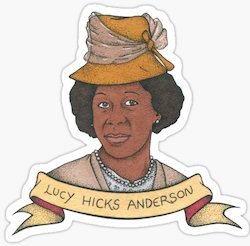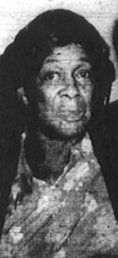Lucy Hicks Anderson: “I have lived, dressed, acted just what I am, a woman."
As part of our 30 Things that Bring Us Pride event, we want to acknowledge some the people who labored -- and those who are still laboring -- to make our communities safer and more welcoming for all LGBTQ+ people. Our primary focus is on events and people in the Northwest, but we're highlighting Lucy Hicks Anderson because, well, she was amazing.
Lucy Hicks Anderson was an African American woman who built a life and impressive entrepreneurial career in Oxnard, CA based on her many skills, including being a prize-winning and sought-after cook, socialite, event hostess, community member, and madame of a successful bordello and Prohibition-era bar. The criminal justice system and Lucy's community turned on her when, after examining her, a doctor went public claiming that she was a "man." She fought for her right to be married to the man she had married. She fought for her right to be who she was.
Note: Although it‘s very possible that she would identify as a trans woman if she were alive today, no one knows what words Lucy Hicks Anderson would use to identify herself. What we do know is that she publicly identified as and presented as first a girl when she was very young and then as a woman. In this post, I use "she/her" pronouns for Lucy. I'm also going to refer to her by her first name, Lucy, throughout the article. Some of the articles I cite use different names and pronouns for her in various times of her life.
Lucy was born in 1886 in Waddy, Kentucky. Her last name was Lawson, and she was assigned male at birth. According to the TransGriot blog, when she “entered school she insisted on wearing dresses and began calling herself Lucy. Since the transgender definition hadn't been coined at that time to diagnose what was going on in her life, her mother took her to a physician who advised her to raise young Lucy as a girl.” Her mother took the advice. (Props to the doc, her mom and for Lucy!)
Lucy left school in her teens to move to Pecos, Texas, where she worked at a hotel for over a decade, managing some of the housecleaning and other domestic chores. In 1920 she married Clarence Hicks. They moved to Oxnard, California.
Lucy quickly made work for herself as a chef and hostess for wealthy families, who paid a good price for her cooking, hostessing, and many other skills. Oxnard was a farming community about 60 miles north of Los Angeles that was experiencing a population and economic boom rooted in the expanding sugar industry. This drew a lot of wealth to the town, along with thousands of migrant farm laborers hoping to get a stake in the boom. (Fun Beet Facts: According to the LA Times, Oxnard was built on the Sugar kingpin Henry T. Oxnard built a sugar factory with a capacity to process 2,000 tons of beets daily, in exchange for a commitment from local farmers to dedicate 20,000 acres to beets. Between its opening in 1899 and its closing in 1959, the factory sent out close to 40 million 100-pound bags of granulated sugar.)
Oxnard in 1905
Lucy's renown and bank account grew. Wealthy families, churches and other groups competed for her labor; at big events, she would not only prepare the food, but tend to the children, help dress the girls for the party, and then be an efficient and welcoming hostess.
Within a few years of moving to Oxnard, Lucy had saved enough money to purchase property. Lucy expanded her entrepreneurial enterprises to include a boardinghouse and bordello, which became very successful. During Prohibition, Lucy's bordello was one of the few places in town to sell alcohol.
According to the Year of Women's History blog, “The town accepted Lucy in each of these roles.... her success in one area helped maintain the other, and perhaps for Lucy, it was also vice-versa. When she was arrested for selling liquor and being a madam in the years of Prohibition (1920-1923), she was bailed out by Charles Donlon, the town's leading banker, because he has a huge dinner party that night and he needed Lucy to be there to make it successful."
Lucy's first marriage to Charles Hicks ended in 1929. For the next few decades, Lucy's businesses and influence grew and she continued to skillfully avoid criminal charges for running her bordello. As Oxnard grew in the 1940s, Lucy's bordello expanded into a half-block of well-furnished and maintained buildings.
Besides being accepted for her professional enterprises, Lucy was involved with the town personally and intimately. When the United States went to war, Lucy hosted expensive going-away parties for the sons of the town's elites, serving the best champagne. When they got news from the front lines that a local boy has been killed in action, Lucy would drive to the family's house and be with them as they mourned. Lucy also gave generously to the Red Cross and Boy Scout Charities, laughing as she did so, saying "Just don't ask where the money came from." To support the U.S. effort during WWII, Lucy bought nearly $50,000 in war bonds. She was as much a leader of the community as the churchmen and members of government.
In 1944, Lucy married Reuben Anderson, a soldier based in New York.
The beginning of Lucy's unjust legal prosecutions was in the late 1940's, when Lucy was about 59. At the time, Navy soldiers were experiencing an outbreak of venereal disease, which the Navy claimed traced back to Lucy's bordello. Lucy and her employees came under investigation. The laws regarding sexually transmitted diseases gave authorities sweeping rights to force people (in particular, sex workers and other marginalized people) to submit to medical examinations in the course of investigations. All of women working at Lucy's establishment had to undergo examinations.
As part of the investigation, local doctor Hilary R. Morgan insisted on examining Lucy as well. Based on his medical examination of Lucy, the doctor erroneously came to the conclusion that Lucy was a "man." Law enforcement and Dr. Morgan went public with the doctor's conclusion.
Because the legal system defined Lucy as being a "man," both Lucy and Rueben were charged with perjury for marrying. It was illegal for two "men" to marry. Standing up to the charges against her, Anderson said, “I defy any doctor in the world to prove that I am not a woman. I have lived, dressed, acted just what I am, a woman.” They lost their case, and were both given 10 years of probation. Lucy's convictions also included "impersonation" because the legal system defined her as a "man impersonating a woman." The court forbad her from wearing clothing defined as "women's clothes."
The community which had greatly appreciated/exploited Lucy's many contributions to Oxnard -- and which had overlooked her transgressions of Prohibition and prostitution laws -- turned against Lucy based on their misperceptions of her gender.
Lucy during her second court case
The case received a large amount of publicity, which alerted the Army to a possible case of fraud. because Lucy was receiving subsistence allotments as the wife of a soldier. Federal prosecutors filed felony fraud charges against both Reuben and Lucy. The jury found Reuben guilty of fraud and he was sentenced to federal prison. Lucy was convicted of fraud, but only after the judge ordered her to submit to yet another medical exam. She was sentenced to serve a term of imprisonment at the federal penitentiary in Leavenworth, Kansas.
Lucy later in life
Upon their release from prison, Lucy and Reuben wanted to live in Oxnard, but the town’s police chief threatened they would not be welcome for 10 years.
The couple settled instead in Los Angeles, where Lucy lived as her amazing self until she died in 1954.
The We’ve Been Around project has a great video about Lucy’s long and storied life.





